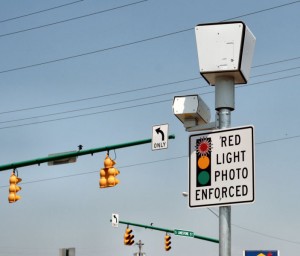Mary Nottebrok received a notice of violation of public safety from the City of Creve Coeur with photographs of the vehicle owned by her traveling through and intersection within the city while the electric light signal was red. The notice, which had been signed by a city police officer, notified her that the penalty was a $100 fine, due within 30 days, and that because the violation was a non-moving violation, no points would be assessed against her driver’s license. The notice further stated that if she failed to pay or contest the violation based on one of the exceptions contained in the ordinance, she would receive a notice to appear in court. When she failed to pay the find or contest it, she was issued a notice to appear in municipal court.
Nottebrok filed a motion to dismiss; the municipal court denied this motion and assessed a fine of $100. Nottebrok then filed an application for trail de novo and another motion to dismiss before the St. Louis County Associate Circuit Court. That court also denied the motion to dismiss and imposed a fine of $100. Nottebrok appealed and the Missouri Court of Appeals for the Eastern District affirmed in City of Creve Coeur v. Nottebrok.

“[V]iolations of municipal ordinances are civil matters but, because of the quasi-criminal nature of an ordinance, are subject to the criminal standard of proof beyond a reasonable doubt.” City of Dexter v. McClain, 345 S.W.3d 883 (Mo. App. S.D. 2011)….Under Missouri law, violations of municipal ordinances shall be heard and determined only before divisions of the circuit court. Section 479.010 RSMo Cum. Supp. 2007.
“Under both the federal and state constitutions, the fundamental requirement of due process is the opportunity to be heard at a meaningful time and in a meaningful manner.” [Jamison v. State Dept. of Social Services, Div. of Family Services, 218 S.W.3d 399, 405 (Mo. Banc 2007)]. However, civil ordinances “need not provide the heightened procedural protections required by the Fifth, Sixth, and Eighth Amendments of the U.S. Constitution. “Mills v. City of Springfield, WL 32567208*12 (W.D. Mo. 2010).
“The purpose of police power is to promote the public health, safety and welfare.” St. Charles County v. St. Charles Sign & Electric Company, Inc., 237 S.W.3d 272, 275 (Mo. App. E.D. 2007)…. Although a city’s police power is not unlimited, it is very broad. St. Charles Sign & Electric, 237 S.W.3d at 275…”The test of whether an ordinance is fairly referable to a legitimate exercise of police power is whether the express requirements of the ordinance have a substantial and rational relationship to the health, safety, peace, comfort, and general welfare of the inhabitants of the municipality.” Bezayiff [v. City of St. Louis, 963 S.W.2d 225, 229 (Mo. App. E.D. 1997)].
“The burden is on the party contesting the ordinance to negate every conceivable basis which might support it.” Id. If reasonable minds might differ as to whether a particular ordinance is substantially related to the protection of the general health, safety, or welfare of the public, then the issue must be decided in favor of the ordinance. Id.

Here, the ordinance “was properly enacted pursuant to the City’s police power for regulating public safety and did not violate Missouri law.” It “is similar to the ordinance at issue in City of Kansas City v. Hertz Corp., 499 S.W.2d 499 (Mo. 1973.).” “Consistent with the Supreme Court’s reasoning in Hertz, Missouri law provides that a municipal ordinance can impose liability on a vehicle owner if another parks or operates the vehicle in violation of the ordinance.”
Here, the photographs on the ticket clearly showed the vehicle’s license plate number and the make and model of the vehicle, which were registered to [Nottebrok]. [Nottebrok’s] liability for violation of [the ordinance] was predicated on her status as owner of the vehicle regardless of whether she was the driver of the vehicle at the time the violation occurred unless one of the ordinance’s exceptions applied.
“Municipalities may enact ordinances that create additional rules of the road or traffic regulations that meet their needs and traffic conditions as long as the ordinance’s provisions are consistent with and do not conflict with state law. Sections 304.120.2 and .3.” Under the plain language of the ordinance, a violation of it is classified as a non-moving violation. The ordinance “did not prohibit ‘running a red light;’ rather [the] ordinance prohibited the presence of a vehicle in an intersection when the traffic control signal for that intersection was emitting a steady red signal for the direction of travel….” “The City intended to impose liability on a vehicle owner for a violation of the ordinance, and that violation was a non-moving infraction for which no points would be assessed.” Thus, the ordinance does not violate Missouri statutes that require the assessment of points against a driver’s license for moving violations.

